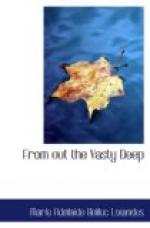“What a splendid idea!” cried Helen. “That’s just how I should like to be married.”
“I, too,” said Sir Lyon, in his pleasant voice. “To me there’s always been something barbaric in the ordinary grand wedding.”
But Blanche Farrow shook her head. “Perhaps because I’m so much older than all of you,” she said good-humouredly, “I think there’s a great deal to be said for an old-fashioned wedding: white dress (white satin for choice), orange blossoms, St. George’s, Hanover Square, and all! I even like the crowd of people saying kind and unkind things in whispers to one another. I don’t think I should feel myself married unless I went through all that—”
And then, at last, James Tapster said something. “Marriage is all rot!” he said, speaking, as was his unpleasant custom, with his mouth full. “There are very few happy married couples about.”
“That may be your experience,” said Varick, speaking for the first time since Blanche had told the great news. “I’m glad to say it isn’t mine. I think marriage far the happiest state—for either a man or a woman.”
He spoke with a good deal of feeling, and both Panton and Helen Brabazon felt very much touched. He had certainly made his marriage a success.
Meanwhile, Blanche suspected that Dr. Panton had just had a letter containing disturbing news. She saw him read it twice over. Then he put it carefully in a note-book he took out of his pocket. “I shall have to go to-morrow, a day earlier than I thought,” he observed. “I’ve got an appointment in town on Thursday morning.”
Then Mr. Tapster announced that he was going to-day, and though Varick seemed genuinely sorry, everyone else was secretly glad.
There are days in life which pass by without being distinguished by any outstanding happenings, and which yet remain in the mind as milestones on the road of life.
Such a day, at any rate to Blanche Farrow, was the day which saw the first disruption of Lionel Varick’s Christmas house party. Though Mr. Tapster was the only guest actually to leave Wyndfell Hall, all the arrangements concerning the departures of the morrow had to be made. Miss Burnaby, Helen Brabazon, and Sir Lyon Dilsford were to travel together. Dr. Panton was going by a later train, as was also Bill Donnington. Blanche herself, with of course Bubbles, was leaving on the Saturday.
As the day went on Blanche realized that Varick much desired that Helen Brabazon should also stay on till Saturday. But she, Blanche, thought this desire unreasonable. Though she had come to like her, she found the good, thoughtful, conscientious, and yet simple-minded Helen “heavy in hand”; she told herself that if Helen stayed on, the entertaining of the girl would fall on her, especially if, as Dr. Panton insisted, Bubbles must not get up till Friday at dinner-time.
Looking back, Blanche Farrow told herself that that day had been full of curious premonitions. Yet it had opened, in a sense happily for her, with the coming of Mark Gifford’s quaint, characteristic letter. Then had come the shock, and it had been a shock, of Bubbles’ engagement, and of the girl’s insistence on its being announced to the rest of the house party at once—at breakfast.




